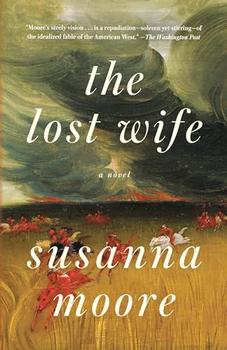Summary | Excerpt | Reviews | Beyond the Book | Readalikes | Genres & Themes | Author Bio

A novel
by Susanna Moore
One night, I heard my mother scream, not a playful taunting scream as I sometimes heard, but a real scream, and I ran into her room. There was a man in the bed. My mother had thrown an oil lamp at him and the bedclothes were on fire. The man jumped from the bed and ran into the street, barefoot and without his trousers, as my mother and I smothered the flames with a blanket.
We were already two months behind on the rent, and the landlord was relieved to be quit of us. That is when we were sent to Dexter, and I was grateful for it. We lived there for three years, although the usual time of service was meant to be six months. Some of the men and women had been there for thirty years, and would be there until they left in a box. Maddie was brought to Dexter when she was seven years old and had grown up there. Her mother and father had died in one of the coffin ships from Sligo, and she'd been found, starving and sick, hiding in a warehouse at India Point. Because she would not speak, could not speak, she was taken to Dexter by the city's dogcatcher. One of the older girls taught her to speak English in exchange for an occasional kiss or two, but she had taught herself to read and write, sneaking into the usually deserted schoolroom to memorize the unused primers.
I made myself indispensable by keeping the dairy's ledgers and receipts. I was proud of my work. One of the feeders liked to pull my hair, but after he told me that cows only dream when they are lying down, I stayed away from him. The men never seemed to bother with Maddie. It was as if her beauty frightened them.
We were given an hour of schooling each morning, taught by two dissolute young men, one of them hairless. Every Thursday, ladies from the town dropped off a box of books as well as old copies of Burton's Gentleman's Magazine for the edification of the inmates. Books that were full of words and images unknown to Maddie and me, as well as to everyone else in the asylum, including the schoolteachers. Stories as well as picture books like Scottish Chiefs and Bronze Age Crete and The Gothic Cathedrals of Lorraine. Lives of the Governors of New York and one of my favorites, a three volume illustrated book of North American trees.
Maddie worried that the ladies would forget to bring the books each week, as she needed to be distracted, needed to be learning something new, which was a way not to be sad. We liked to imagine how some of the books had fallen into the hands of the ladies of College Hill. Perhaps their fathers and husbands were professors, or world–wide travelers. Many of the books had never been opened, their pages uncut and unseen. That is when I discovered Sir Walter Scott and the Brothers Grimm and Hans Christian Andersen. I also liked reading about famous women of the past, Cleopatra and Mary, Queen of Scots and Anne Boleyn, although not Joan of Arc. I still don't know why she was left out, but she was. Maddie said it was because she had no sense of humor, but I don't imagine the women I favored were particularly funny, either. Maddie preferred ghost stories like The Legend of Sleepy Hollow and The Fall of the House of Usher. We were allowed an hour of free time after dinner and that is when Maddie and I would read. I stole a cheese spreader from the dairy to cut the pages, but it did not do a very neat job. I wished I could steal the books, but we had no place to hide them. When we were through with them, we took them to the schoolroom where they were thrown into a closet until the closet became too full and they were throw into the farm's waste pit. It was Maddie who taught me that books weren't just for learning, but that you could read because you liked to, and to find out things you would never have known otherwise. All my love then went to books. And to Maddie, of course.
Although men and women lived in separate wings of the building and were punished should they meet anyplace other than at work on the farm or in the dairy, my mother found a way to meet men and sometimes women in an empty basement storeroom. She was caught when one of the women, whose husband was a favorite of my mother's as he paid in tomatoes, reported her to the matron. We were left at the front gate with five dollars, new shoes two sizes too big, and a warning not to return. It was 1848. My mother was thirty-two years old. I was eighteen.
Excerpted from The Lost Wife by Susanna Moore. Copyright © 2023 by Susanna Moore. All rights reserved. No part of this excerpt may be reproduced or reprinted without permission in writing from the publisher.
Your guide toexceptional books
BookBrowse seeks out and recommends the best in contemporary fiction and nonfiction—books that not only engage and entertain but also deepen our understanding of ourselves and the world around us.